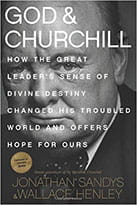Editors' Note: This article is part of the Patheos Public Square on Engaging the New Year. Read other perspectives here.
 Wallace Henley and Jonathan Sandys have co-authored a new biographical work on the life and legacy of the great British statesman: God & Churchill: How the Great Leader's Sense of Divine Destiny Changed His Troubled World and Offers Hope for Ours.
Wallace Henley and Jonathan Sandys have co-authored a new biographical work on the life and legacy of the great British statesman: God & Churchill: How the Great Leader's Sense of Divine Destiny Changed His Troubled World and Offers Hope for Ours.
In our research on Winston Churchill, Jonathan Sandys — his great-grandson — and I discovered a man who passed through many hard times, but never gave up on "time."
One of the keys to Churchill's endurance was that he believed earnestly in God's providence. Historical events comprised providential history. Therefore, when he wrote his great works on history he presented it not as unrelated fragments in time, but as a story with meaning and purpose.
Winston Churchill lived and led with the sense that the story was still being written, that things were moving toward purpose, that the point of it all would someday come together and make sense. As the war with Germany descended on Britain — and ultimately the world — Churchill spoke solemnly but also hopefully. Victory would come, he said, "in God's good time."
We human beings are always looking for the "good time," the "right time," the "opportune time." We know intuitively that there is something more about time than merely the ticking of the clock. In six billion years that clock will "wind down" and the earth will die, say the physicists. Just think, we might be half way there already. In other words, when it comes to finite time, the cup is half full, and thus the future is limited by the quantity already present.
But is it?
In the words of promising politicians, quick-sale artists, fine-line inscribing lawyers, and hosts of other outright frauds, carefully cloaked charlatans, and over-promisers: "It all depends."
Except in this case it really does.
Newton gave us the idea of "absolute time" and Einstein the theory of "relative time." Quantum physics has messed up all the hypotheses. It shows us the world is "stranger" than we have imagined: incomprehensively tiny particles that are twinned so that their movements influence one another even if they are worlds apart (like Fred Astaire in one galaxy and Ginger Rogers in another across the universe swing-dancing in perfect sync), and other miniscule bits of matter that seem to be influenced by human observation.
The Bible presents God as having his Being in the absolute infinity called eternity, but who also can manifest his existence in finite, tensed time at any point. New Testament Greek even has words to distinguish the two — kairos (timing in the context of opportunity and purpose) and kronos (the mere passage of tensed time). The concept is shown in all those "fullness of time" passages, like Galatians 4:4, "when the fulness of the time came God sent forth his Son."
This is also the point Jesus makes when he tells Mary at the wedding in Cana when she presses him to perform a miracle that "my time" has not yet come. It is also why Jesus' enemies could not kill him until the intersection of his kronos-moments with his kairos-purpose — the Cross.
Many regard a cup half-empty as a negative. What was there has gone away, never to be recovered. However, the half-empty cup can be viewed as a positive; there's room for more. The difference is this: if one thinks only in terms of finite content, the half-empty cup is a sad thing indeed, because there is no more after it is drained. However, if we see the issue from the perspective of infinite supply, the half-empty cup has room for more abundance, and is therefore a positive.
That's why God empties us to fill us.
If we look at time from the biblical perspective, there is much more to come into the "cup" of time. From the material perspective we have drained the cup by 50 percent. From the biblical perspective the cup is only half full and therefore more kairos is pouring into kronos.
But here is where it gets interesting, and inspiring. There will be a point when the kronos cup is full and "time (kronos) will be no more." But because the "cup" is suspended in the infinity of God's absolute space-time, the flow will never cease. The overflowing of the cup signified by the Greek meaning of kairos is constant. Once the initial content exhausts the "cup," more keeps coming and coming and coming. (Think of a crystal cup on the sunken Titanic that quickly reached the limits of its capacity in the depths of the Atlantic, and shattered without any lessening of the liquid it once contained.)




